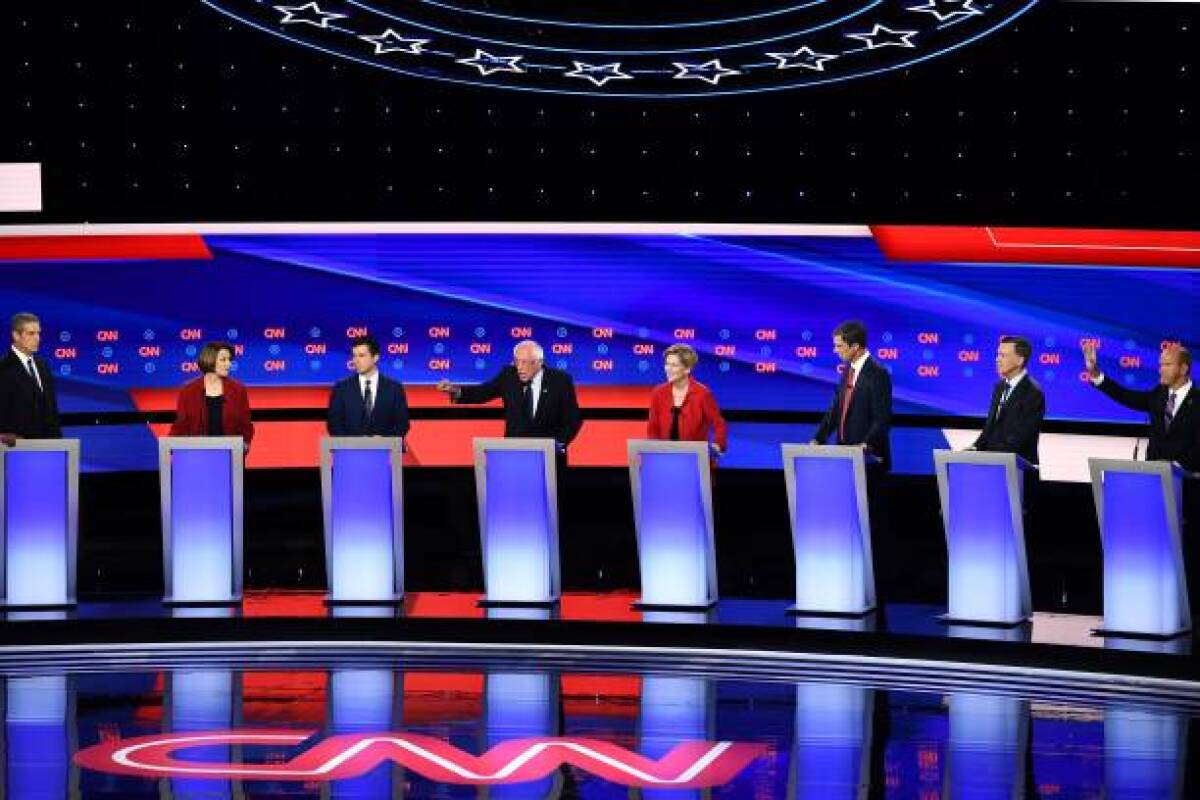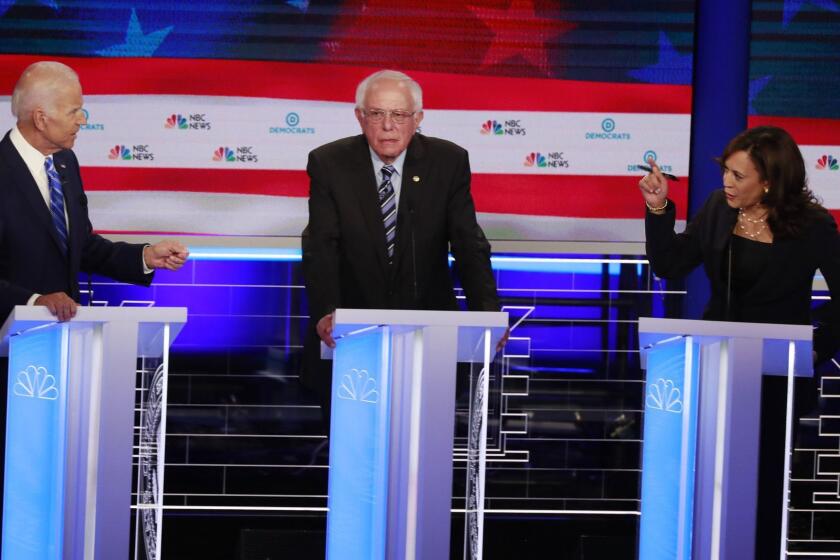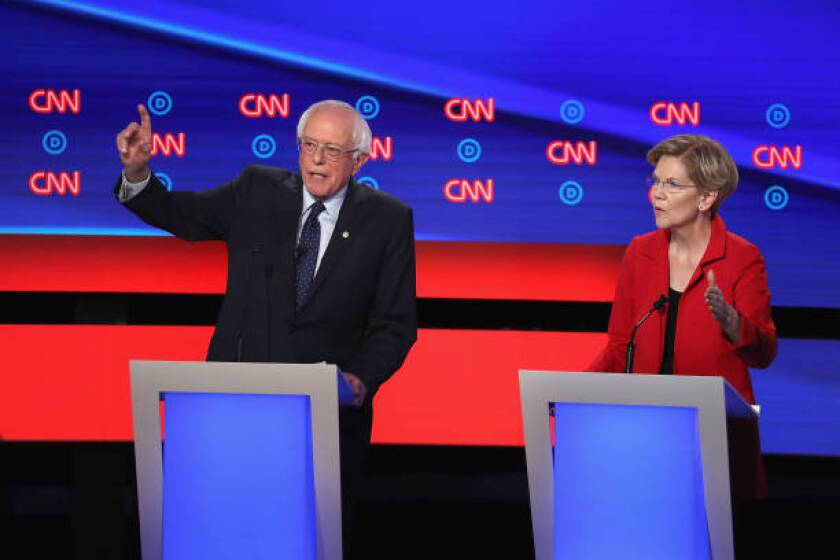News Analysis: Debate highlights Democrats’ key question: Will big plans thrill voters or terrify them?

WASHINGTON — The Democrats’ raucous presidential debate Tuesday highlighted a fundamental choice facing the party in 2020: Whether to pick a presidential nominee who calls for big, ambitious policies for healthcare, the environment and the economy, or one with a more centrist, pragmatic approach.
The exchanges exposed intraparty divisions about policy, ideology and political strategy that pitted two leading progressive voiceswho are top-tier candidates — Sens. Elizabeth Warren of Massachusetts and Bernie Sanders of Vermont — against an array of rivals who warned that the party risks losing to President Trump if it moves too far to the left.
The group of lesser-known candidates served as a kind of debating proxy for former Vice President Joe Biden, the top-polling candidate who is scheduled to be on stage Wednesday night and who has opposed Medicare for all and other progressive policies that form the core of both Sanders’ and Warren’s campaigns.
For struggling candidates like former Colorado Gov. John Hickenlooper, Sen. Amy Klobuchar of Minnesota and former Rep. John Delaney of Maryland, the best hope for continuing as viable options may be to emerge as the moderate alternative in the event that Biden’s candidacy fizzles.
These candidates gave voice — even more aggressively than Biden has — to concerns that the strongly progressive agenda gaining favor in some parts of the party is unrealistic and politically risky.
“You might as well FedEx the election to Donald Trump,” said Hickenlooper, who pushed back against progressives’ ambitious plans to fight climate change and provide Medicare for all.
“Let’s get real,” said Klobuchar. “Tonight we debate, but ultimately we have to beat Donald Trump.”
“You’re going to hear a lot of promises up here,” she added. “Yes, I have bold ideas, but they are grounded in reality.”
Since April, half of Democratic primary voters have changed their minds about which candidate they favor, the latest USC-Dornsife/Los Angeles Times poll finds. Joe Biden continues to lead, but the poll highlights the volatile nature of the contest.
For centrists and Democrats who say they’re being pragmatic, the party’s move to the left in recent years and the rise of Warren and Sanders — they are running behind Biden but ahead of almost all other candidates in most polls — raises the risk of a political disaster on par with the losses suffered by liberal presidential nominees like George McGovern in 1972, Walter Mondale in 1984 and Michael Dukakis in 1988.
“We can go down the road that Sen. Sanders and Sen. Warren want to take us, which is with bad policies like ‘Medicare for all,’ free everything and impossible promises that will turn off independent voters and get Trump reelected,” said Delaney, a candidate who may not make it to the next round of debates, but who made the most of his opportunities to criticize Warren in this one.
The debate over moving to the left with big ideas versus appealing pragmatically to centrist voters parallels a still-heated argument over why the party’s 2016 nominee, Hillary Clinton, lost to Trump in the key electoral battlegrounds of Wisconsin, Michigan and Pennsylvania.
Some Democratic strategists point to Clinton’s losses among working-class white voters, many of whom had voted for President Obama, and argue that the Democrats need to pitch their campaigns to winning those voters back.
Others note that Clinton also failed to inspire a large turnout of young and minority voters in Milwaukee, Detroit and Philadelphia. The path to victory in the key states is to come up with an inspirational message that will turn out those voters, that camp argues.
Democrats clash on climate policy, immigration and healthcare as dark-horse candidates use the debate to battle over the direction of the party.
It is not clear from polling that the party’s drift to the left is making it more vulnerable to charges of extremism. A HuffingtonPost/YouGov poll earlier this year found that 41% of Americans said the Democratic Party was too extreme. That was unchanged from a poll in 2014.
But many Democratic strategists worry that it’s only a matter of time — and greater exposure — before the ideas advocated by Warren and Sanders begin to scare off moderate voters.
Nowhere does the division loom larger than on healthcare, the issue that many believe is a key to Democrats’ political success because it was central to the party’s victories in the 2018 midterms, when they won control of the House.
The main issue is whether Democrats should call for eliminating the employer-provided insurance that currently covers the vast majority of working-age Americans, and require everyone to enter a government-run health plan. Sanders and Warren made a bold defense of the most far-reaching alternative while other candidates proposed less abrupt, although still significant, change.
Hickenlooper, for example, called for “evolution, not revolution.”
Warren and Sanders — who came into the debate as rivals for voters in the party’s left wing — joined forces in making the case that the party faces a bigger risk if it runs a cautious 2020 campaign. They warned that caution would fail to mobilize Democrats and other voters needed to beat Trump — and fail to address the deep economic and political problems that gave rise to Trump in the first place.
“We are not going to solve the urgent problems that we face with small ideas and spinelessness,” Warren said.
“It is not going to be easy” to beat Trump, said Sanders. “We need to have a campaign of energy and excitement and vision.... I get a little tired of Democrats who are afraid of big ideas.”
At some point, as the campaign advances, Sanders and Warren will inevitably clash as they compete for progressive voters. Their aides have acknowledged that they will have to find ways to distinguish themselves from each other.
But for now, they instead found themselves playing tag team, agreeing with each other and making the same fundamental argument — that the 2020 election is about more than defeating Trump and that voters will respond to a candidate who promises bold ideas, not just a Trump-free capital.
“The Democrats are the party of big, structural change,” said Warren. “We need to give people a reason to show up and vote.”
More to Read
Get the L.A. Times Politics newsletter
Deeply reported insights into legislation, politics and policy from Sacramento, Washington and beyond. In your inbox three times per week.
You may occasionally receive promotional content from the Los Angeles Times.













